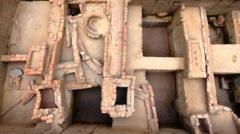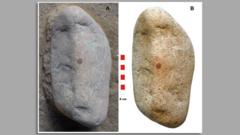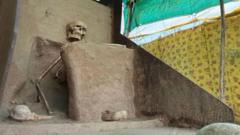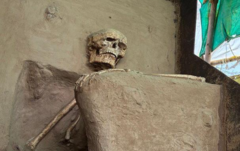Keeladi, a village located in Tamil Nadu, India, has emerged as a crucial archaeological site that is intensifying political debates and historical interpretations. Recent excavations have unearthed artifacts dating back to 580 BCE, including terracotta pots and ancient brick structures, contradicting previously held beliefs regarding early Indian civilizations.
Archaeologists from the Tamil Nadu State Department of Archaeology have been uncovering evidence of a sophisticated ancient urban settlement, with finds such as water systems and burial urns highlighting the region's historical importance. The site's discoveries have provoked discussions among politicians, historians, and epigraphists, transforming Keeladi into a symbol of regional pride amidst India's long-standing north-south cultural divide.
The excavation process at Keeladi initiated in 2013, targeting a 100-acre site that had previously yielded red-and-black pottery, is now revealing over 15,000 artifacts. Archaeologist Ajay Kumar emphasized that these findings indicate a literate and urban society, premised on distinct spaces for living, industrial activity, and burial practices. This challenges the narrative that urbanization in ancient India was primarily a northern phenomenon stemming from the Indus Valley Civilization.
The revelations contribute to a growing narrative that the Tamil Brahmi script may predate the Ashokan Brahmi script. Discovered graffiti in the Tamil Brahmi script, dating to the 6th Century BCE, is said to suggest that both scripts evolved independently. Some researchers propose that this may indicate an influx of cultural exchanges from the ancient Indus Valley.
As political disputes intensify, critics accuse the central government of obstructing Tamil cultural heritage, especially following the controversial transfer of ASI archaeologist Amarnath Ramakrishnan, who has been at the forefront of the excavations. Tamil Nadu’s Chief Minister has condemned the lack of support from the federal government as an attack on Tamil heritage.
The ongoing dialogue around Keeladi reflects a deeper struggle over historical identity in India. While the archaeological community debates the origins and implications of these findings, the site itself has become a nexus for questions about regional and national narratives, spurring a quest to understand the interconnectedness of ancient civilizations.
Children exploring exhibits at the Keeladi Museum are part of an ongoing effort to educate the public about the region's rich past, signaling a hopeful pursuit of knowledge amid the political clash. As journalists and authors alike seek to uncover the complexities of history, Keeladi represents a critical chapter in the evolving discourse on India's diverse cultural heritage.






















